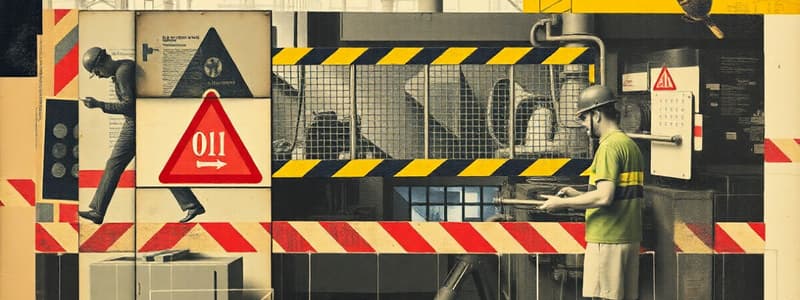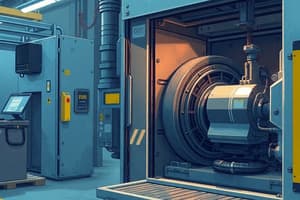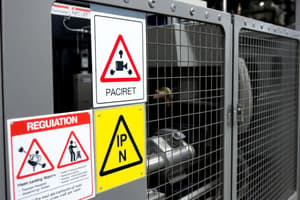Podcast
Questions and Answers
The purpose of ______ is to control exposure to heat and ensure safety in the workplace.
The purpose of ______ is to control exposure to heat and ensure safety in the workplace.
ventilation
The ______ of control at source is a method to reduce exposure to hazardous conditions in the workplace.
The ______ of control at source is a method to reduce exposure to hazardous conditions in the workplace.
principle
Good illumination is vital for ______ because it enhances visibility and reduces the risk of accidents.
Good illumination is vital for ______ because it enhances visibility and reduces the risk of accidents.
safety
The significance of ______ is emphasized in maintaining a clean and organized work environment.
The significance of ______ is emphasized in maintaining a clean and organized work environment.
Understanding the ______ of heat regulation is important for ensuring employee comfort and health.
Understanding the ______ of heat regulation is important for ensuring employee comfort and health.
The primary purpose of machine guarding is to ensure the safety of __________.
The primary purpose of machine guarding is to ensure the safety of __________.
Lifting machinery includes devices such as cranes, elevators, and __________.
Lifting machinery includes devices such as cranes, elevators, and __________.
During manual handling, excessive muscular effort should be __________ to prevent injury.
During manual handling, excessive muscular effort should be __________ to prevent injury.
To ensure safe operation, operators of lifting machinery must undergo __________ training.
To ensure safe operation, operators of lifting machinery must undergo __________ training.
Electrical hazards can arise from improper handling of __________ equipment.
Electrical hazards can arise from improper handling of __________ equipment.
Inspection and maintenance of hand tools help control __________ accidents.
Inspection and maintenance of hand tools help control __________ accidents.
Devices such as chain slings and hooks are part of __________ mechanisms in lifting.
Devices such as chain slings and hooks are part of __________ mechanisms in lifting.
Safety features in the design of tractors and power trucks include __________ mechanisms.
Safety features in the design of tractors and power trucks include __________ mechanisms.
Flashcards
Machine Guarding
Machine Guarding
Protecting workers from hazards associated with moving machinery parts. This involves using barriers, enclosures, or other devices to prevent access to dangerous areas.
Types of Machine Guards
Types of Machine Guards
Various types of guards exist, each suited for different machinery and hazards. Examples include fixed guards, interlocked guards, and adjustable guards.
Safe Use of Hand Tools
Safe Use of Hand Tools
Using hand tools correctly and safely to prevent injuries. This includes selecting the right tool for the job, inspecting tools for damage, and using proper techniques.
Electrical Hazards
Electrical Hazards
Signup and view all the flashcards
Safe Lifting Practices
Safe Lifting Practices
Signup and view all the flashcards
Mechanical Handling Equipment
Mechanical Handling Equipment
Signup and view all the flashcards
Electrical Equipment Safety
Electrical Equipment Safety
Signup and view all the flashcards
Safe Working Load (SWL)
Safe Working Load (SWL)
Signup and view all the flashcards
Static Electricity Control
Static Electricity Control
Signup and view all the flashcards
Electricians' Role in Safety
Electricians' Role in Safety
Signup and view all the flashcards
Good Illumination
Good Illumination
Signup and view all the flashcards
Pressure Vessel Safety
Pressure Vessel Safety
Signup and view all the flashcards
Housekeeping's Role in Safety
Housekeeping's Role in Safety
Signup and view all the flashcards
Study Notes
Machine Guarding
- Statutory provisions outline principles for machine guarding
- Types of guards (e.g., fixed, movable) and their design/selection are crucial
- Specific guarding requirements exist for various machinery (woodworking, paper, rubber, printing, machine tools)
- Built-in safety devices are essential components of machinery
- Routine maintenance and repair of guards are vital for safety
- Incidental safety devices and tools are important for enhancing overall safety
Manual Handling and Storage
- Hazards associated with manual handling (e.g., strains, injuries) are significant concerns
- Minimizing excessive muscular effort is a key preventative measure
- Correct lifting techniques (kinetic methods) should be employed
- Maximum loads/weights that can be safely carried must be understood
- Safe handling of materials of different shapes, sizes, and weights is critical
- Secure storage of materials is vital
Mechanical Handling of Materials
- Safety aspects must be integrated into the design, construction, and testing of machinery like cranes, elevators, conveyors, dumpers, pay loaders
- Comprehensive operator training is critical to safe operation, signaling, inspection, and maintenance of lifting machinery
- Power trucks and tractors (e.g., forklifts) require specific safety features in design, construction, and operation
- Safety features like slings (chain, rope, fibre, wire), hooks, shackles, swivels, and eye bolts are used in lifting
- Safe working loads must be calculated accurately
Hand Tools and Portable Power Tools
- Tool accidents are caused by various factors (poor maintenance, improper use)
- Centralized tool control improves safety and management
- Tools should be properly stored, inspected, maintained, and repaired
- Understanding causes of tool failure (material defects, misuse, etc.) is essential
- Proper tempering, sharpening, and safe handling of tools are necessary
- Hand tools (metal cutting, wood cutting, etc.) and portable power tools should be chosen, maintained, inspected, and used correctly
Electrical Hazards
- Electrical hazards (shock, burns) are serious concerns
- Adequate safety limits (amperage, voltage) must be adhered to
- Safe distances from electrical lines are critical
- Conductors, joints, and connections should be appropriately insulated and protected
- Power should be shut off before work is done on electrical systems
- Protective measures (overloads, short circuits, earth faults) are necessary
- Insulation, continuity, and earth fault tests are essential
Industrial Lighting
- Adequate lighting is critical for safety/avoiding accidents
- Sources and types of artificial lighting (LEDs, fluorescent, incandescent) are used and their principles are crucial
- Recommended illumination standards must be met
- Well-designed, maintained light installations are essential
- Colour considerations for lighting installations need to be incorporated
Safety of Pressure Vessels
- Statutory provisions dictate safety for fired and unfired pressure vessels (e.g., boilers)
- Thorough testing (design, construction, and operation) is a legal requirement for safety
- Boiler safety and operational precautions are critically important
Ventilation and Heat Control
- Ventilation is necessary to maintain a favorable working environment (avoiding heat stress, health issues)
- Thermal environment measurement and temperature regulation standards (heat stress indices, thermal limits) are crucial
- Ventilation methods (natural, mechanical, air conditioning, process) should be considered, considering heat exposure
- Thermal comfort varies and must be analyzed carefully
- Reducing heat sources and managing workplace temperatures are crucial to create a safe environment
Housekeeping
- Proper housekeeping is essential for safety (5S methodology)
- Management's role is significant in maintaining a safe environment
- Hazards of poor housekeeping practices (spillages, improper storage, etc.) are highlighted
- Scrap and waste disposal, gangway marking, and colored-coded markings are necessary
- Employee participation and inspections are key aspects of good housekeeping
Special Precautions (Height/Confined Spaces)
- Specific safety procedures are necessary when working at heights and in confined spaces (e.g., work permits)
Laws and Regulations
- Factories Act, Indian Electricity Act, Explosive Act, Gas Cylinders Rules, and relevant regulations need to be followed
Studying That Suits You
Use AI to generate personalized quizzes and flashcards to suit your learning preferences.




